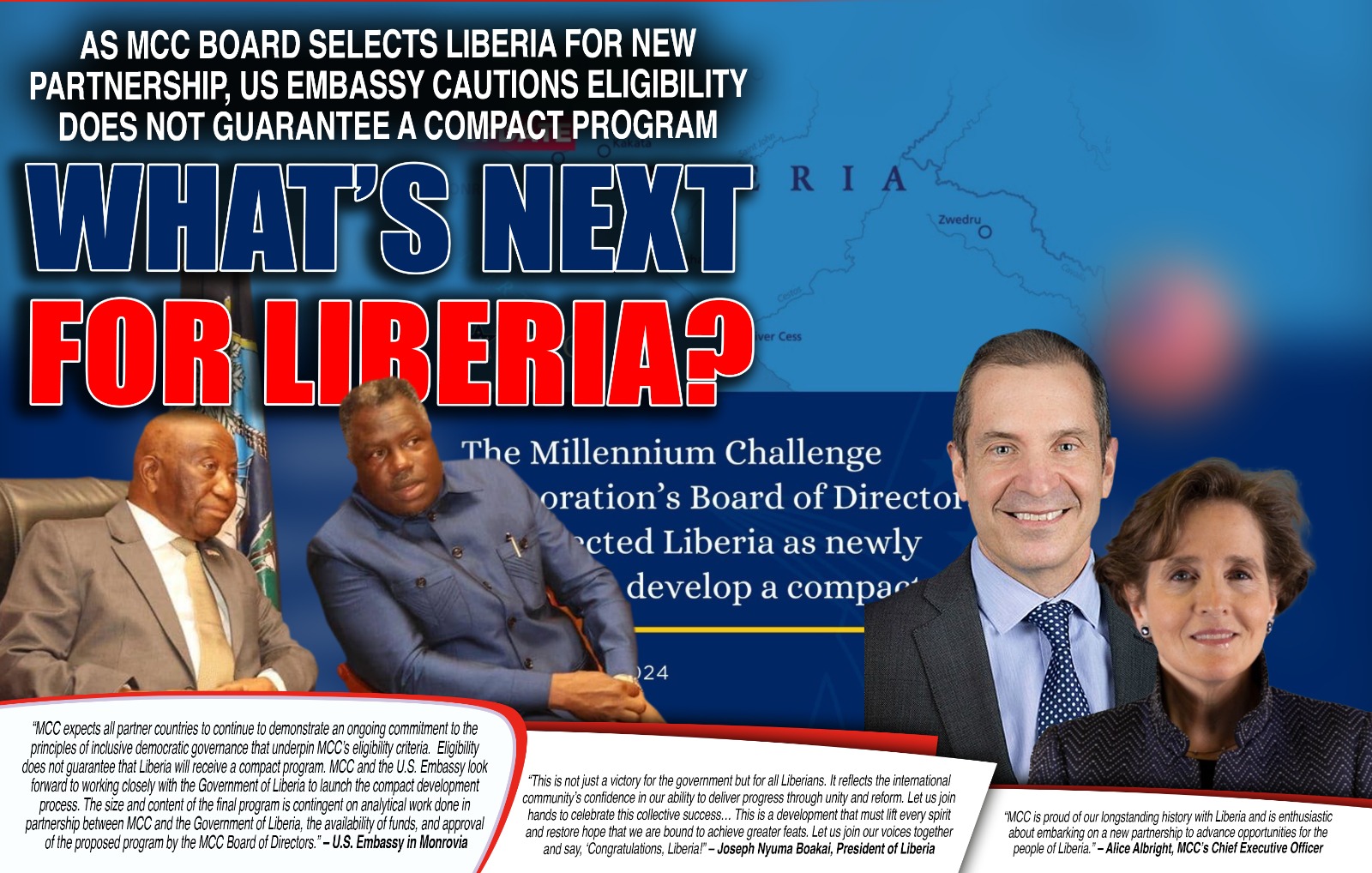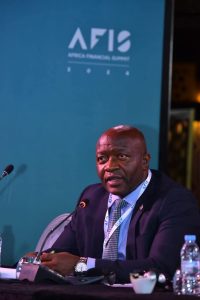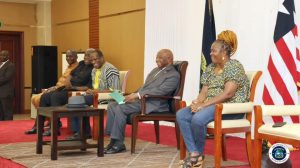Liberia: As MCC Board Selects country for New Partnership, US Embassy Cautions Eligibility Does Not Guarantee A Compact Program

Monrovia – The announcement that Liberia has been selected by the Millennium Challenge Corporation (MCC) Board of Directors to develop a compact has been met with jubilation by the government and the Liberian populace.
By Gerald C. Koinyeneh, gerald.koinyeneh@frontpageafricaonline.com
This development comes after Liberia passed 11 out of 20 indicators on the Millennium Challenge Corporation’s scorecard for the 2025 Fiscal Year, marking a slight decline from the previous year’s 14. The news was first disclosed by President Joseph Nyuma Boakai on Wednesday night during his national address at the Executive Mansion, even before the MCC’s official announcement.
“This is not just a victory for the government but for all Liberians. It reflects the international community’s confidence in our ability to deliver progress through unity and reform. Let us join hands to celebrate this collective success… This is a development that must lift every spirit and restore hope that we are bound to achieve greater feats. Let us join our voices together and say, ‘Congratulations, Liberia!” President Boakai stated.
The MCC subsequently confirmed Liberia’s selection on its website, stating that the decision was in recognition of the progress the country has made in strengthening its performance on the MCC scorecard and its commitment to pursuing critical economic and democratic governance reforms. MCC’s Chief Executive Officer, Alice Albright, expressed enthusiasm about the new partnership, saying, “MCC is proud of our longstanding history with Liberia and is enthusiastic about embarking on a new partnership to advance opportunities for the people of Liberia.”
What’s Next for Liberia?
Contrary to public perception, being selected by the MCC Board does not automatically guarantee a compact program. The U.S. Embassy in Monrovia cautioned that eligibility alone does not ensure Liberia will receive a compact.
In a release, the Embassy noted, “MCC expects all partner countries to continue to demonstrate an ongoing commitment to the principles of inclusive democratic governance that underpin MCC’s eligibility criteria. Eligibility does not guarantee that Liberia will receive a compact program. MCC and the U.S. Embassy look forward to working closely with the Government of Liberia to launch the compact development process.”
The Embassy further explained that the size and content of the final program will depend on analytical work conducted in partnership between MCC and the Government of Liberia, the availability of funds, and approval by the MCC Board of Directors.
MCC Programs
The MCC offers two types of programs for selected countries. Its flagship program, the compact, is a five-year grant agreement generally valued between $100 million and $700 million. Liberia has previously benefited from an MCC compact.
According to the Congressional Research Service (CRS), partner governments develop and implement compacts under MCC guidelines and oversight. The process begins with a “growth diagnostic”—an analysis of the principal constraints (usually one to three) to faster economic growth and poverty reduction. Countries then select constraints and propose corresponding projects for approval by the MCC Board. If approved, the compact is signed, followed by a years-long preparatory period before implementation. Compacts generally invest in physical infrastructure, policy reforms, and capacity-building measures. Sub-Saharan Africa remains a primary focus for MCC investments, with transport and energy as top sectors.
Liberia’s Previous Compact
In 2015, the United States Government, through MCC, provided $257 million to Liberia to enhance access to reliable and affordable electricity and improve road maintenance. The Compact contributed $146.3 million to rehabilitate the Mt. Coffee Hydro Power Plant, the largest donor support to the plant, accounting for 40% of the total $350 million reconstruction cost. With an 88 MW generating capacity, Mt. Coffee has significantly expanded reliable and affordable electricity supply, benefiting over 82,000 homes and businesses compared to just 34,000 in 2016. The project also reduced the average duration of electricity outages by 83% and decreased outage frequency by 45%, according to the US Embassy.
Raw Water Pipeline Construction
The Compact funded the construction of a new 48-inch diameter Raw Water Pipeline between Mt. Coffee and the White Plains Water Treatment Plant, replacing a damaged 36-inch pipeline unused since Liberia’s civil war. By eliminating saltwater intrusion into the treatment plant, the new pipeline improved water quality and reduced operational costs by an estimated $780,000 annually. It now provides better-quality water to about 1 million residents of Monrovia and surrounding areas. The project’s total cost was $18 million.
LEC Management and Other Investments
The Compact also supported the Liberia Electricity Corporation (LEC) through a management services contract with ESB International (ESBI) to enhance operational and financial efficiency. Additional investments included procurement of connection materials, refurbishment of LEC’s customer service center, capacity-building for LEC staff, and the establishment of the Liberia Electricity Regulatory Commission.
Future Prospects
While the government has yet to announce specific projects for the new compact, speculation suggests it will prioritize energy and road infrastructure, which remain key areas for development.
Who takes the credit?
President Boakai emphasized that the selection reflects the improvements made under his administration, saying, “Today, thanks to the significant improvements we have made in our governance process, the Millennium Challenge Corporation (MCC) has officially informed me that Liberia’s outstanding performance has qualified the country for a second Compact.”
However, Samuel Tweah, former Finance Minister under the Weah administration, argued that Liberia’s selection was based on strong performance on MCC’s scorecards during the previous administration. Tweah explained that the 2025 scorecard, published in November 2024, reflects data from March 2023 to March 2024—a period primarily under the Weah administration.
As Liberia embarks on the compact development process, all eyes will be on the government to deliver impactful projects that address the country’s critical development challenges.
The post Liberia: As MCC Board Selects country for New Partnership, US Embassy Cautions Eligibility Does Not Guarantee A Compact Program appeared first on FrontPageAfrica.





